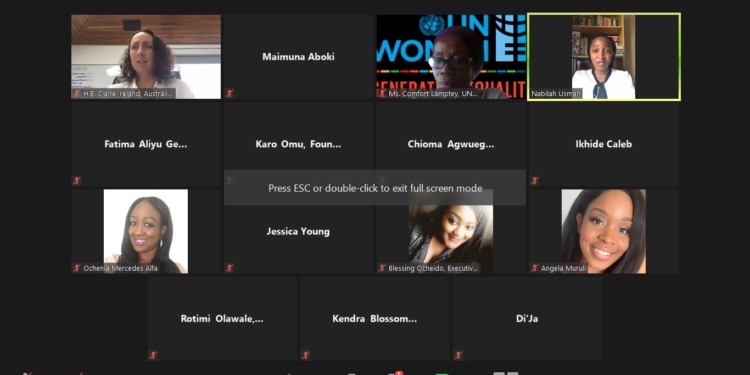Blessing Ocheido, Executive Director of Platinum Intervention Care Initiative has called for the creation of safe spaces for girls with disabilities, as measures to prevent them from being victims of gender and sexual-based violence.
Ocheido made the call while speaking at a webinar organized by the Australian High Commission in Nigeria and UN Women Nigeria in commemoration of the International Day of the Girl Child 2020.
Ocheido in her presentation stressed the need to ensure that women with disabilities, especially young girls are not left behind in the conversation as they are often used as a means to solicit for alms on the street, a target for sexual and physical violence.
Ms Ocheido said “We have to start by making accessible spaces for young girls with disabilities, we also have to ensure that there are mentorship programmes for young girls with disabilities.
“We need to ensure they are taught that it is all right to be a young girl with a disability, that they can dream dreams and amount to anything they want with the right support system.
She buttressed that, “we need to create safe spaces for them and ensure that they are carried along and their contribution matter in every aspect t of the society having it at the back of our mind that disability could happen to anyone.
“It is important that data are driven to be inclusive, researches are carried out to carry along young girls with disability, that we have their faces, we know their names, empowered to live a productive and full life.”
Another panellist, Rotimi Olawale, co-founder Youth Hub Africa, stressed the need to engage men both young and old in ending violence against women and girls.
Mr Olawale said “there are a lot of behaviours and social practices that men and young boys have picked up over time and need to unlearn such as catcalling, abusing women, unwanted touching of women in the workplace, at home and in schools.
“We need to give equal attention to boys and girls, to ensure they become responsible people to society.
“Parents tend to put more attention on young women, they are not given the chance to explore, to go out to learn new things all in the guise of protecting women.
“We need to give equal attention to boys and girls, give them the opportunity to develop their potential and ensure they become responsible people to the society,” he added.
Earlier in her opening remark, the United Nations Women Representative to Nigeria and ECOWAS, Ms Comfort Lamphey said “This day hopes to highlight the contribution of girls and give the opportunity for them to reimagine a better world which is inspired by the dreams of adolescent girls.
“As adolescent girls, the international day will focus on their demands to live free from gender-based violence and harmful practices.
“Learn new skills towards the future that they choose and lead a generation of activist accelerating social change working hand in hand with human rights activist who will continue to serve as their mentors.
“I am very encouraged personally by the global attention and focus that we have seen this year to mark the international day of the girl child, it is very important for us to sustain this momentum and commitment to advancing the right of women and girls.
“At UN Women we recognise that the voices and concerns of adolescent girls must be amplified because empowered girls make empowered women.”
The webinar themed – ‘Becoming Generation Equality: Engaging Girls’ Voices for an Equal Future’, was organized with the aim of amplifying the voices and concerns of girls across Nigeria, and features the premiere of ’12-Year-Old Self’, a short film by the Australian High Commission.
The one-day event was supported by the joint EU, UN Spotlight Initiative to eliminate violence against women and girls.

